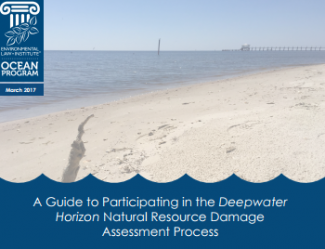A Guide to Participating in the Deepwater Horizon Natural Resource Damage Assessment Process

When an oil spill occurs, natural resources like fish, birds, and marshes may be injured. A natural resource damage assessment (NRDA) is a process focused on figuring out what those injuries are, coming up with a plan to fix those injuries, and then fixing them. This document is intended to help guide you as you determine how to engage in the Deepwater Horizon NRDA process. Following some brief background, the document is divided into two parts. The first part provides a general overview of points in the process where you can participate; the second part identifies some specific ways to engage in the process, depending on your priorities, along with resources that are available to help. We focused on four priorities: Stay Informed about the NRDA Process, Help Get “Good” Projects In the Ground, Share Information Among Citizens and With Trustees, and Involve the Community in Project Selection, Implementation, and Monitoring. Note that links to many of the resources have been included. They, along with other resources, can also be found at www.eli-ocean.org/gulf/eli-resource-repository. Keep in mind that these are just some of the ways the public may be able to participate. You can find more information on the Deepwater Horizon NRDA, as well as on some current opportunities to participate, at www.gulfspillrestoration.noaa.gov.